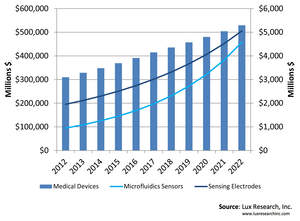BOSTON, MA--(Marketwired - Sep 17, 2013) - With health care costs soaring at an unsustainable rate, providers are increasingly moving into a preventive mode, with an emphasis on screening and very early diagnostics. As a result, key sensor technologies will boom, with microfluidic devices growing to a $4.5 billion market and sensing electrodes to $5 billion in 2022, according to Lux Research.
Of the microfluidics market, $1.3 billion will accrue to material suppliers for glass, polymers, and silicon. In the sensing electrodes market, material suppliers will garner $3 billion, or 60% of the total, for materials like functionalized adhesives and novel sensing elements.
"The medical device industry is responding to changing global health care demands," said Milos Todorovic, Lux Research Analyst and the lead author of the report titled, "A Materials Perspective on Medical Sensors." "Medical sensors have emerged as key enablers for the shift towards decentralized health care, creating new opportunities for material providers."
Lux Research analysts examined the drivers and barriers to growth for microfluidics-based sensors and sensing electrodes through 2022. Among their findings:
- Costs will be driven lower. Market dynamics and technical advances will drive the cost of materials for a microfluidic device 32% lower to about $0.50 in 2022, accelerating adoption. While glass will still contribute 50% to the total cost, the share of polymers will double to 10% as platforms using cheaper polymer-based consumables gain market share.
- Sensors penetrate markets new and old. Market adoption will happen in two distinct ways: replacement of existing centralized equipment, such as blood panel and urinalysis in the primary care physician offices; and opening new non-clinical POC markets, such as infectious disease diagnostics at home.
- Exciting range of advanced sensors is emerging. Novel sensors can go beyond physiological evaluation, studying emotions and moods, interpreting human voice to recognize behavioral markers, and even analyzing facial expressions to monitor vital signs. Start-ups developing such technologies include Affectiva, an MIT spinoff; Cogito Corporation; and Asthmapolis.
The report, titled "A Materials Perspective on Medical Sensors," is part of the Lux Research BioElectronics Intelligence service.
About Lux Research
Lux Research provides strategic advice and ongoing intelligence for emerging technologies. Leaders in business, finance and government rely on us to help them make informed strategic decisions. Through our unique research approach focused on primary research and our extensive global network, we deliver insight, connections and competitive advantage to our clients. Visit www.luxresearchinc.com for more information.
Contact Information:
Contact:
Carole Jacques
Lux Research, Inc.
617-502-5314
carole.jacques@luxresearchinc.com
